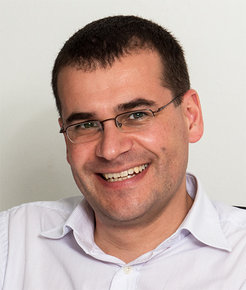Carsten Grashoff awarded the BINDER Innovation Prize 2018
The German Society for Cell Biology acknowledges each year outstanding cell biological research with the BINDER Innovation Prize. In 2018, the recognition goes to Carsten Grashoff from the MPI of Biochemistry for the development and application of methods allowing the quantitative analysis of mechanical forces in cells. The technique permits the investigation of mechanical processes under physiological conditions and has become a valuable tool to study the mechanobiology of cells and tissues. The prize giving ceremony will be held at the International Meeting of the German Society for Cell Biology in Leipzig on September 17, 2018.

The ability to generate, sense, and respond to mechanical forces is a property inherent to all cells. However, it has remained unclear how mechanical signals are processed on the molecular level because suitable methods to quantify forces across individual proteins in living cells were missing. Carsten Grashoff and his research team have developed and optimized techniques that overcome this limitation by generating genetically-encoded calibrated biosensors, which can detect extremely small mechanical forces as little as a few piconewton. When inserted into individual proteins and expressed in cells, these probes allow spatially and temporally resolved molecular force measurements using quantitative microscopy techniques. Initial studies of the Grashoff lab primarily focused on the analysis of cell adhesion mechanics leading to the identification of mechanical linkages that are crucial for proper adhesion and rigidity sensing of cells. By now, the so-called tension sensor technique has been also applied in many other research laboratories to investigate biomechanical processes underlying cellular force transduction.
About the Awardee:
Carsten Grashoff studied Applied Science at the University of Freiberg and earned his PhD degree at the Max Planck Institute of Biochemistry in 2007. For his postdoctoral work, he moved to the University of Virginia (USA) and in 2011 he returned to the Max Planck Institute of Biochemistry as an independent research group leader. In 2018, Carsten Grashoff was appointed as a Professor at the University of Münster.












